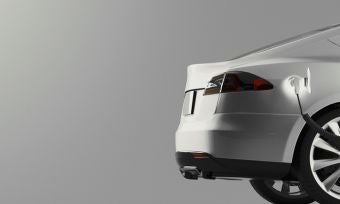Thanks to former government subsidies, high petrol prices and consumers looking to go green, electric cars have become a popular option. But when it comes to buying an electric car, what are the costs involved, and how much money do you save in comparison to buying a petrol car, if any?
Canstar compares the costs associated with electric cars vs. petrol cars:
In this article we cover:
Electric cars vs. petrol cars: purchasing costs
How do electric cars compare to petrol ones when it comes to sticker price?
Currently, the cheapest new EV in the country is the GWM Ora, which starts at $37,990, plus on-road costs (ORC). This compares to $25,990+ORC for a new hybrid Suzuki Swift.
And while the price of the petrol MG ZS starts at $24,990+ORC, the fully electric version, the MG ZS EV, costs considerably more, from $40,990+ORC.
Below is a rundown of the prices of the top three selling EVs and petrol vehicles in New Zealand to the end of November 2024.
As you can see, even though entry-level EVs have become cheaper over the past few years, EVs are still more expensive than comparable petrol models:
Top three selling EVs
| Car model | Approx starting price |
| Tesla Model Y | $65,900 |
| Ford Mustang Mach-E | $74,990 |
| BYD Atto 3 | $51,990 |
Top three selling cars
| Car model | Approx starting price |
| Toyota RAV4 | $48,790 |
| Mitsubishi ASX | $27,990 |
| Mitsubishi Outlander | $56,990 |
Electric cars vs. petrol cars: running costs
Before the introduction of road user charges (RUCs) for EVs and plug-in hybrids (PHEVs), EVs had very low running costs. However, now EV drivers have to pay the same RUCs as diesel vehicle owners: $76.00 per 1000km plus an admin fee of at least $12.44 per licence. This increases the cost of running an EV by $8.84 per 100km:
Approximate EV running costs:
| Car model | kWh per 100km | Cost per 100km (35.4c per kWh*) | Total cost + $8.84 RUC per 100km |
| Tesla Model Y | 15.7kWh | $5.56 | $14.40 |
| Ford Mustang Mach-E | 17.2kWh | $6.09 | $14.93 |
| BYD Atto 3 | 14.5kWh | $5.13 | $13.97 |
*Based on national average electricity price. Correct as of 15/10/2024
Approximate petrol vehicle running costs:
| Car model | l per 100km | Cost per 100km ($2.65 per litre*) |
| Toyota RAV4 | 5.3l | $14.05 |
| Mitsubishi ASX | 8.5l | $22.53 |
| Mitsubishi Outlander | 8.6l | $22.79 |
*Based on national average unleaded 91 price, as cited by Gaspy. Correct as of 09/01/2025
It’s worth noting that the RAV4 listed above is cheap to run because, like most new Toyota models, it’s a petrol hybrid, which are exempt from RUCs. But even taking into consideration RUCs, running an EV is still a lot cheaper than fuelling a petrol car.
And there are ways of lowering the running costs of an EV even further. For example, by opting for a power plan with off-peak power rates, your EV running costs could be significantly lower. Or, even better, if you opt for a power plan with free power hours, you could wind up paying nearly nothing at all to charge your EV.
From this year, it’s also going to cost more for EV to licence their vehicles. From the 2025-26 financial year, the Accident Compensation Corporation (ACC) is increasing its levy for EV owners by almost 160%, raising it from $42.09 per year, to $109.05.
Petrol car drivers will also pay more, but their levies are only going up 17%, from $42.09 per year, to $49.38. But while this does mean EV owners will incur more costs, it’s not a game-changer in the overall cost of keeping an EV on the road.
Compare electricity providers for free with Canstar Blue!
Electric cars vs. petrol cars: maintenance & servicing costs
The average EV only has around 20 moving parts, compared to over 2000 in an internal combustion engine vehicle. As a result, EVs generally cost less to service and maintain than petrol cars.
Indeed, the big-brand car service chains that cater to EV and hybrid owners usually charge less for their EV packages than for their petrol-vehicle deals.
→ Related article: How Much Does A Car Service Cost?
Are EVs cheaper to run than petrol cars?
Even with the RUCs, EVs are cheaper to run that cars with conventional petrol engines. But once you factor in total costs, including government levies and electricity charges, the cost of driving an EV is not much different to driving a petrol hybrid.
However, overall, PHEVs have some of the lowest running costs, beating EVs and petrol hybrids. This is due, in part, because PHEVs drivers pay a lower RUC rate of $38 per 1000km (plus an admin fee of at least $12.44 per licence), and also because a mid-range PHEV SUV such as the Mitsubishi Eclipse Cross can deliver great fuel economy of 2.1l per 100km. Based on the same figures we’ve used above, that works out at only $10.61 per 100km:
| Car | $ per 100km |
| Petrol | $22.66 |
| EV | $14.43 |
| Petrol Hybrid | $14.05 |
| Plug-in Hybrid | $10.61 |
So while going all-electric might be better for your carbon footprint, fuelling your car use with at least some fossil fuels could be better for your hip pocket.
Compare Outstanding Value Car Insurance with Canstar
Looking for great value car insurance for you and your family? Each year, we release our car insurance awards, including winners for Insurer of the Year, Outstanding Value, and Most Satisfied Customers. As part of our award results, we also publish our Outstanding Value Star Ratings, covering car insurance for different age groups. Below are our top-rated providers in the drivers aged 30-49 category. Click here to view our complete car insurance Star Ratings for all age groups.
Comprehensive Cover: Drivers 30-49:
| Provider | Star Rating |

Car Insurer of the Year |
 |
 |
|
 |
 |
See here for our ratings methodology. The table above is an abridged version of our research. For the full results of our latest Car Insurance Ratings and Award, click here.
About the author of this page
Bruce Pitchers is Canstar NZ’s Content Manager. An experienced finance reporter, he has three decades’ experience as a journalist and has worked for major media companies in Australia, the UK and NZ, including ACP, Are Media, Bauer Media Group, Fairfax, Pacific Magazines, News Corp and TVNZ. As a freelancer, he has worked for The Australian Financial Review, the NZ Financial Markets Authority and major banks and investment companies on both sides of the Tasman.
In his role at Canstar, he has been a regular commentator in the NZ media, including on the Driven, Stuff and One Roof websites, the NZ Herald, Radio NZ, and Newstalk ZB.
Away from Canstar, Bruce creates puzzles for magazines and newspapers, including Woman’s Day and New Idea. He is also the co-author of the murder-mystery puzzle book 5 Minute Murder.








Share this article